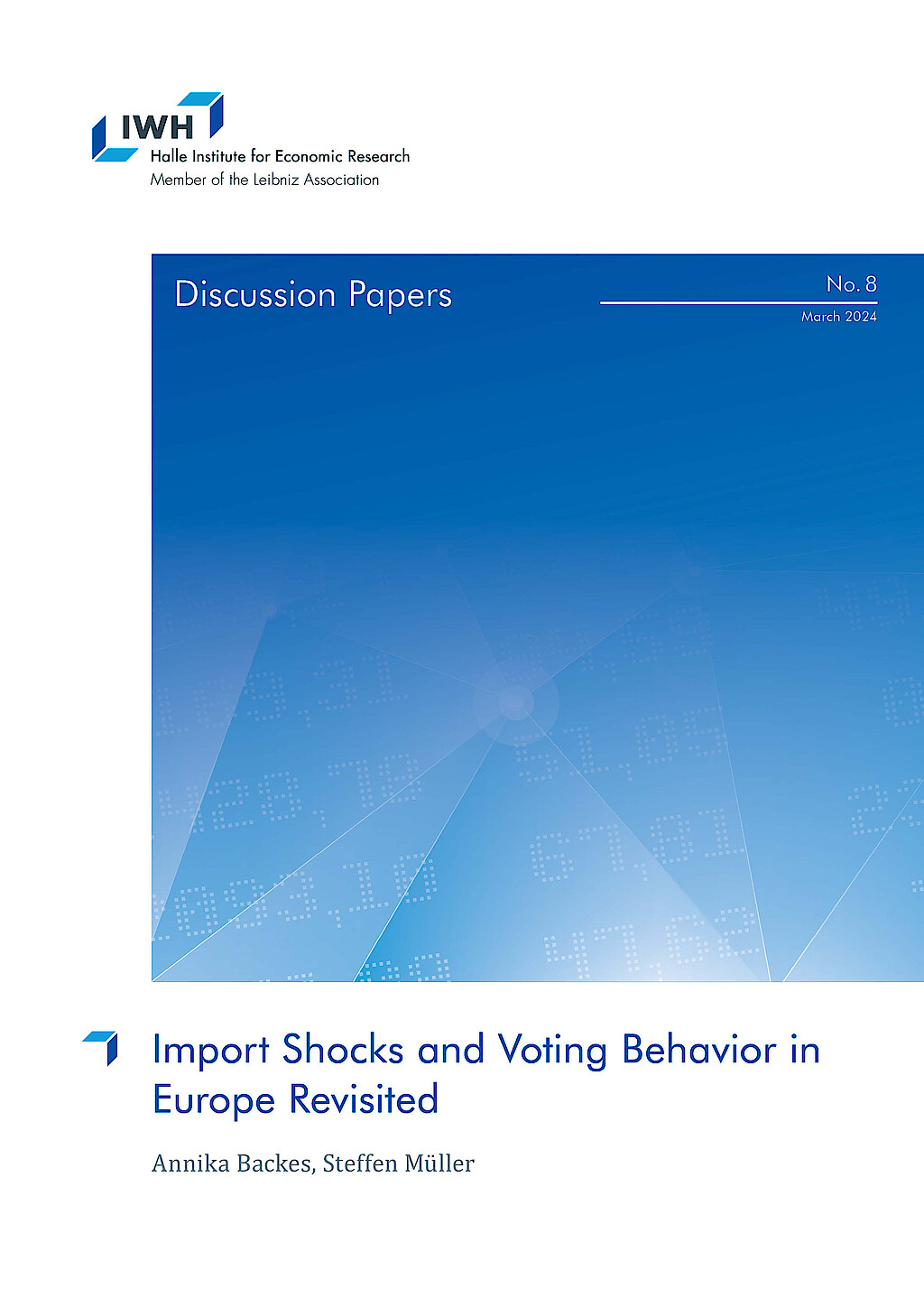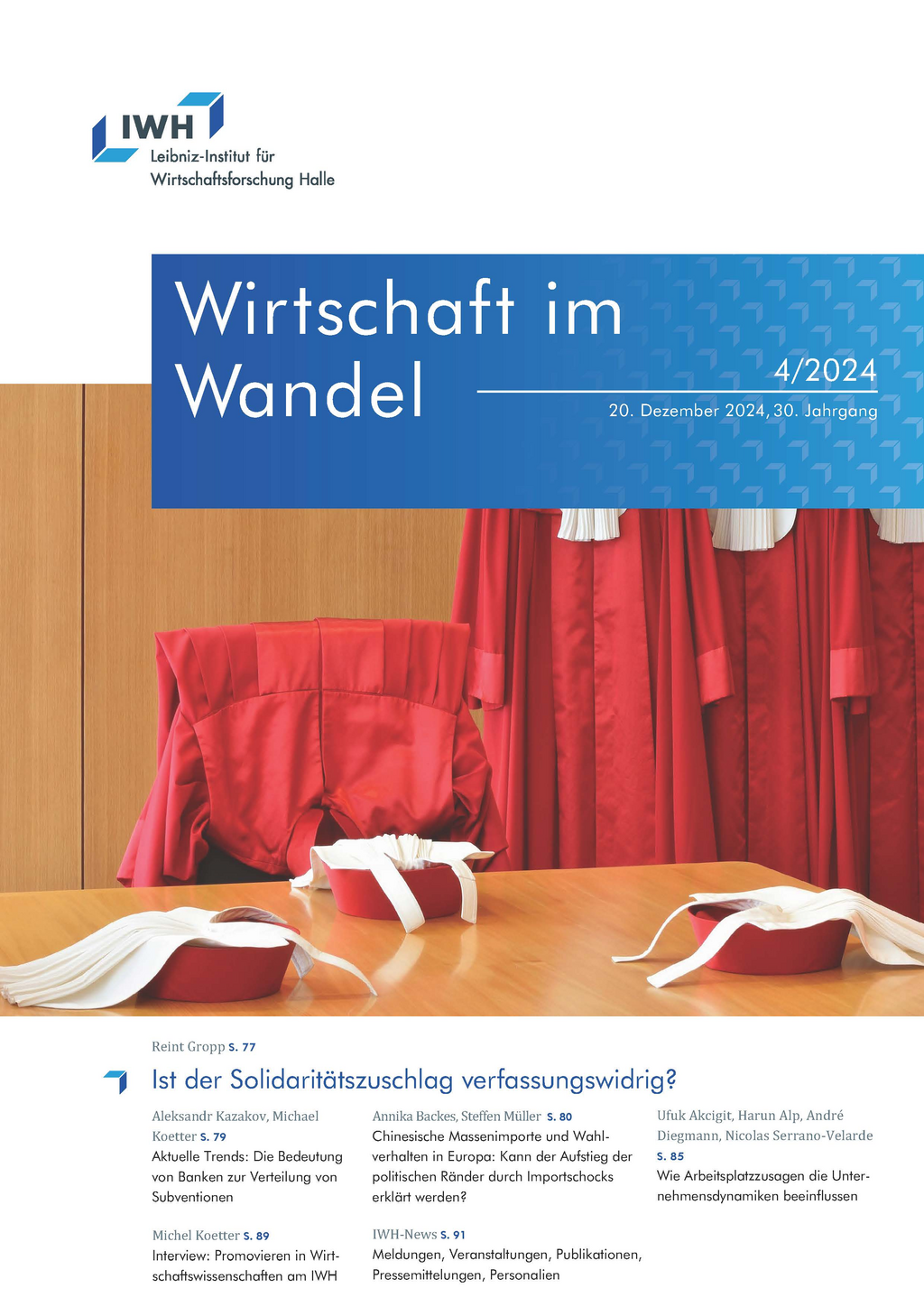Inhalt
Seite 1
Globalisierung und WahlverhaltenSeite 2
Daten, Definitionen und MethodikSeite 3
Ergebnisse: Kurz- und Langfristeffekte sind verschiedenSeite 4
Endnoten Auf einer Seite lesenEndnoten
1 Die Studie entstand im Rahmen eines internationalen und interdisziplinären Forschungsprojektes (siehe https://www.iwh-halle.de/forschung/projekte/europas-populistische-parteien-im-aufwind), welches von der Volkswagen Stiftung finanziert und gemeinsam mit Politik- und Wirtschaftswissenschaftlern der University of Nottingham, der Akademie věd České republiky/CERGE-EI in Prag und der University of Glasgow durchgeführt wurde. Der vorliegende Beitrag basiert auf: Backes, A., Müller, S.: Import Shocks and Voting Behavior in Europe Revisited, in: European Journal of Political Economy, Vol. 83, June 2024, 102528.
2 Autor, D.; Dorn, D.; Hanson, G.; Song, J.: Trade Adjustment: Worker- level Evidence, in: The Quarterly Journal of Economics, Vol. 129 (4), 2014, 1799–18600.
3 Dauth, W.; Findeisen, S.; Suedekum, J.: The Rise of the East and the Far East: German Labor Markets and Trade Integration, in: Journal of the European Economic Association, Vol. 12 (6), 2024, 1643–1675.
4 Yi, M.; Mueller, S.; Stegmaier, J.: Industry Mix, Local Labor Markets, and the Incidence of Trade Shocks, in: Journal of Labor Economics, Vol.43 (3), 2024, 837–875.
5 Autor, D.; Dorn, D.; Hanson, G.; Majlesi, K.: Importing Political Polarization? The Electoral Consequences of Rising Trade Exposure, in: American Economic Review, Vol. 110 (10), 2020, 3139–3183.
6 Colantone, I.; Stanig: The Trade Origins of Economic Nationalism: Import Competition and Voting Behavior in Western Europe, in: American Journal of Political Science, Vol. 62 (4), 2018, 936–953.
7 Dippel, C.; Gold, R.; Heblich, S.; Pinto, R.: The Effect of Trade on Workers and Voters, in: The Economic Journal, Vol. 132 (641), 2022, 199–217.
8 Ruggie J. G.: International Regimes, Transactions, and Change: Embedded Liberalism in the Postwar Eeconomic Order, in: International Organization, Vol. 36 (2), 1982, 379-415.
9 Margalit, Y.: Economic Insecurity and the Causes of Populism, Reconsidered, in: Journal of Economic Perspectives, Vol. 33 (4), 2019, 152–170.
10 Dauth, W.; Findeisen, S.; Südekum, J.: Trade and Manufacturing Jobs in Germany, in: American Economic Review Vol. 107 (5), 2017, 337-342.
11 Aufgrund von Datenverfügbarkeit verwenden wir für Deutschland NUTS1 Regionen, welche den Bundesländern entsprechen.
12 Der Populismusindex misst, in welchem Ausmaß eine Partei in einem Wahljahr populistische Rhetorik verwendet, siehe "Varieties of Party Identity and Organization" (V-Party, Lindberg et al., 2022)
13 Auf Basis von PopuList, siehe https://popu-list.org/.
14 Mudde, C.: Populist Radical Right Parties in Europe. Cambridge University Press, Cambridge 2007.
15 March, L.: Radical Left Parties in Europe. Routledge, London 2012.
16 Mudde, C.: The populist Zeitgeist, in: Government and Opposition, Vol. 39 (4), 2004, 541–563.
17 In Österreich lagen die Stimmanteile der rechtspopulistischen und rechtsextremen FPÖ bereits um das Jahr 2000 sehr hoch. Der Rückgang im Wahlanteil rechtsextremer und rechtspopulistischer Parteien von diesem hohen Niveau aus ist auch auf den sogenannten Ibiza-Skandal der FPÖ im Jahr 2019 zurückzuführen.







